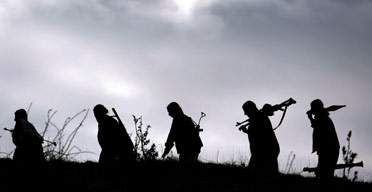Turkey has been fighting against Kurdistan Workers' Party (PKK) terrorism for the last 30 years. Expectedly, this long-lasting fight has produced its own clichéd arguments, too. Without analyzing the major transformations of the sides involved, and political factors, Turkish intellectuals in the mainstream media, especially liberals with leftist backgrounds, have been circulating these clichés.
The first argument is the following: “The last 30 years have proved that neither the PKK nor the state can win this war.”
Wining the war here refers to militarily defeating the PKK, not removing the problems that cause the unrest among Kurds. In fact, it is true that the state could not win this war, basically because it did not want to win it. And there are a number of reasons why. First, the state did not want to implement democratic reforms or give basic rights to the Kurds, thus, it withheld the rights of the Kurds by using the PKK as a good excuse. In a way, the very existence of the PKK helped the state to push back Kurdish demands. The state, by maintaining the PKK risk at a level that did not pose a national security threat, postponed the democratization process.
Second, the state, by using the PKK as an excuse, kept the Kurds in northern Iraq under pressure to maintain its interests and military presence there. Whenever the Turkish state thought the PKK was developing more than expected, Turkey conducted massive operations to curb its expansion. One can find many examples of this.
The following question will further highlight the state's stance: When the PKK declared a cease-fire between 1999 and 2004 and withdraw its units to outside of the country, why didn't the state implement democratic reforms for Kurds, especially when it was shuffling its system to become a member of the EU? The answer is simple. The state never considered the PKK as a major threat to its national interests; it always used the terrorist organization as an excuse for its domestic policies and international interests.
Third, the political rivalry in Ankara between the military and the civilians was another reason why the military did not want to win this war. It was one of the reasons for the military to use the PKK as an excuse to maintain its influence over the government.
Fourth, 20 years ago, the military technology that is available today was not available to win the war without serious losses. Now, however, with the smart bombs and drone technology, the state has an enormous advantage helping it to find and kill PKK militants in deep valleys.
The PKK leadership misread this long-lasting strategy of the Turkish state and thought that the state would never defeat the PKK. In particular, the hard-liners in the PKK thought the Justice and Development Party (AKP) government and the Turkish state were at their weakest point, and with the Kurdish Communities Union (KCK) network the PKK was at its strongest. Therefore, the PKK thought it could win the war against the state if it launched a war that triggered a public revolution.
Yet it failed, because the state's policies toward northern Iraq and domestic politics as well as its perspective towards Kurds have changed. The state no longer considers granting democratic rights as a danger to its national unity. Instead, the state thinks that the existence of the PKK, with its deeply penetrated network among Kurds, is a threat to the Turkish state. Therefore, it has decided to remove the PKK from the face of the earth and it is likely now that the state will win this war.

Δεν υπάρχουν σχόλια:
Δημοσίευση σχολίου